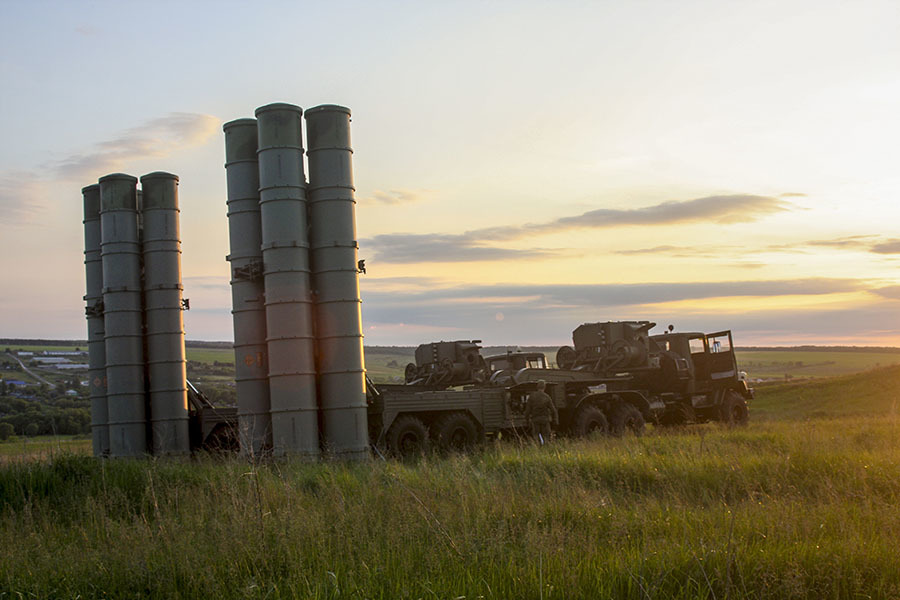An agreement on the creation of a unified regional air defense system (air defense) of Russia and Tajikistan is being approved by the authorities of the two countries.
This was stated by Colonel-General Yuri Grekhov, Deputy Chairman of the Coordinating Committee for Air Defense under the Council of Defense Ministers of the CIS countries.
"The agreement on the creation of a unified regional air defense system of the Russian Federation and the Republic of Tajikistan, signed on April 27, 2021, is undergoing the ratification procedure," Grekhov quotes TASS.
In addition, the high-ranking military man said that a draft agreement on the creation of a unified regional air defense system of Russia and Kyrgyzstan is also undergoing the procedure of domestic coordination, after which the document will be submitted for signature to the heads of the Ministry of Defense of the two countries.
Colonel-General Grekhov added that work continues on the practical implementation of agreements between the Russian Federation, Armenia and Kazakhstan.
In mid-April, he reported on the implementation of measures to adapt the unified air defense system of the CIS to solving the tasks of aerospace defense.
Anti-aircraft missile-gun complex "Pantsir-S"
RIA News
© Maxim Blinov
one system
Recall that in February 1995, Russia, Armenia, Belarus, Georgia, Kazakhstan, Kyrgyzstan, Tajikistan, Turkmenistan, Uzbekistan and Ukraine signed an agreement on the creation of a Joint Air Defense System of the CIS member states (CIS air defense OS).
This structure brings together the air defense forces of the countries - parties to the treaty to jointly achieve the set goals.
Its tasks include ensuring the protection of the participants' borders, joint control over order in the airspace, warning about the aerospace situation, warning about missile and air attacks, as well as conducting coordinated actions of air defense forces to repel an air attack.
The control of air defense forces within the framework of this system is carried out by national commanders, and interaction takes place through the Central Command Post of the Air Defense of the Russian Federation.
All national commanders are also members of the Air Defense Coordination Committee under the Council of Defense Ministers of the CIS countries, which is now headed by the Commander-in-Chief of the Russian Aerospace Forces, Colonel-General Sergei Surovikin.
It is worth noting that not all signatories to the treaty continue to remain its members and carry out joint airspace defense.
So, in 2008 Georgia withdrew from the CIS.
In addition, Turkmenistan does not take part in the activities of the CIS air defense system, and bilateral agreements were signed with Uzbekistan and Ukraine at one time.
Now the most active participants in the joint air defense system, along with Russia, are Belarus, Kazakhstan and Armenia.
The CIS air defense forces include 19 air units, 38 units of anti-aircraft missile forces, 15 units of radio technical troops, nine air defense brigades and three units of electronic warfare.
In addition, this structure has its own research organization - the 2nd Central Research Institute of the Ministry of Defense of the Russian Federation.
Anti-aircraft missile systems S-300 "Favorite"
RIA News
© Ministry of Defense of Russia
A military expert, director of the Air Defense Museum in Balashikha, Yuri Knutov, in an interview with RT, noted that the signing of new bilateral agreements between the Russian Federation and the CIS countries to create regional air defense systems is needed to simplify the modernization of the CIS air defense system.
“The CIS air defense system was created after the collapse of the USSR and included the information network that was built on the old analog principles.
Today, digital technologies are used everywhere, so the question arose about replacing this system.
Russia has already agreed on the modernization of air defense systems with Belarus, Armenia, Kazakhstan, "- explained the interlocutor of RT.
He added that when signing bilateral agreements, specific conditions are stipulated that must meet the requirements of a modern air defense system, in particular information channels, the order of duty, the exchange of information and the conduct of exercises.
“Due to the fact that Russia engages the countries that are part of the joint air defense system, modernizes them, introduces new digital principles, helps equip them with new systems, thereby helping its allies under the air defense agreement to protect its airspace and ensure its security "- Knutov noted.
Geopolitical need
Military experts and analysts, in an interview with RT, stressed that this step was very timely due to the rapid change in the military-political situation in Central Asia.
The hasty withdrawal of US and NATO units from Afghanistan contributed to the rapid seizure of power in the country by the Taliban *.
A large number of weapons and equipment fell into the hands of the militants, including transport planes and Black Hawk helicopters.
"Afghanistan has a large number of aircraft left from the United States, which can subsequently violate the borders of other Central Asian countries or transfer both terrorist groups and drugs," a military expert, retired colonel Viktor Litovkin, explained in an interview with RT.
The agreements signed with the allies are beneficial to Russia, which will receive data on what is happening in the airspace of nearby countries and, if necessary, the ability to stop the flights of enemy aircraft, the analyst added.
“It is also beneficial for Tajikistan, Kyrgyzstan and Armenia, since they will receive various Russian air defense systems at domestic prices, and Russian specialists will train their personnel,” the expert noted.
In turn, Yuri Knutov emphasized the importance of creating a unified air defense system with a wide coverage in connection with the proliferation of hypersonic weapons.
“After all, the sooner Russia sees a hypersonic target, the more chances it has to turn on its additional anti-missile defense intercept systems and destroy enemy targets,” the expert concluded.
* "Taliban" - the organization was recognized as terrorist by the decision of the Supreme Court of the Russian Federation of February 14, 2003.

